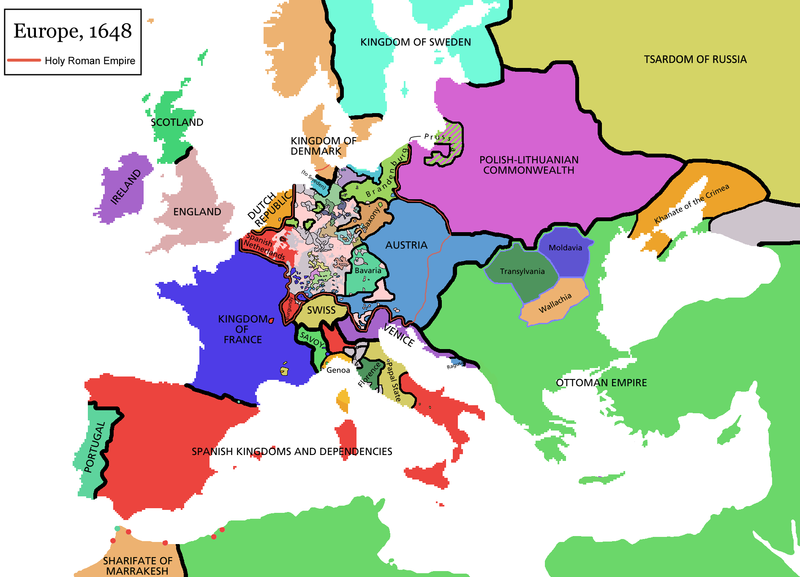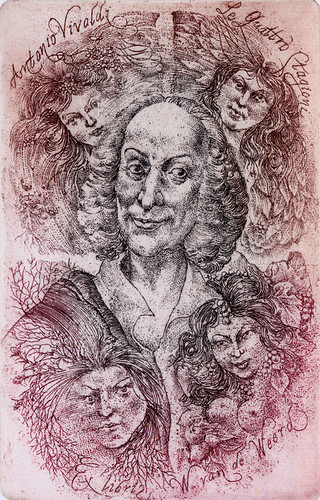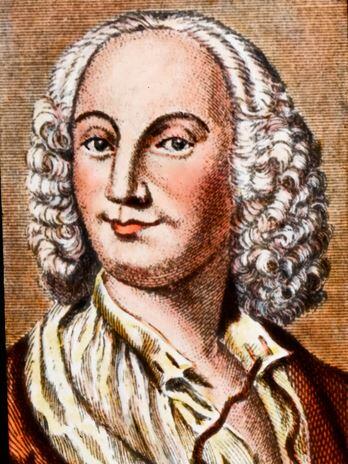



COMPOSER'S FIRST NAME




Antonio




COMPOSER'S DATES




1678-1741




COUNTRY OF ORIGIN




Italy (Republic of Venice)
Vivaldi's music evokes the joy, color and
excitement of the city in the 18th century.

| Gabriele Bella: The Women's Regatta on the Grand Canal, Venice |
|
|
| The Greek neighborhood of Venice where Vivaldi lived and worked. |
Trombae in D and E-flat from J. W. Haas, Nürnberg ca. 1700 |
Concerto for Two Trumpets
in C Major RV 537
Jaime Laredo, Violin
Scottish Chamber Orchestra
Jaime Laredo, Violin
Scottish Chamber Orchestra
Jaime Laredo, Violin
Scottish Chamber Orchestra
"The Four Seasons" consists of four
complete 3-movement concertos.
Each concerto represents a different
season with the music illustrated in
sound from a picture created by an
accompanying sonnet (poetic
commentary) thus making this piece
an early example of program music
(where the music tells a story or
depicts a scene). In it Vivaldi
captures the mundane sounds of
daily life with a small orchestra and
solo violin, creating moods and
impressions by employing various
instruments to represent, for example,
birdsong, a sleeping shepherd and a
barking sheepdog along with more
dramatic sounds like a violent
spring storm.
3. Mandolin Concerto
in C Major
1725
Mandolin Concerto
in C Major RV 425
Avi Avital, Mandolin
Arte Mandolinistica, Japan
4. Mass: Gloria in D
1715
Gloria in D RV 589
R. Mlkeyan, Conductor
National Chamber Orchestra and Choir of Armenia
This, his most famous choral piece,
presents the traditional Gloria from the
Latin Mass in twelve varied cantata-like sections.
 |
| Canaletto: The Feast Day of Saint Roch in Venice |
in A MINOR
RV 356 OPUS 3 NO. 6
Itzhak Perlman, Violin
Israel Philharmonic Orchestra
https://www.youtube.com/watch?v=eTPiZup0QmM
Israel Philharmonic Orchestra
in A MINOR
in G MAJOR
RV 310 OPUS 3 NO. 3
"L'estro Armonico"
Jeanne Lamon, Conductor
Elizabeth Wallfisch, Violin
Tafelmusik
https://www.youtube.com/watch?v=J6b7WH9Le-E#t=11



CONCERTO for FOUR VIOLINS
in B MINOR
RV 580 OPUS 3 NO. 10
https://www.youtube.com/watch?v=4GKjRdWZ5zc
"L'estro Armonico"
Jeanne Lamon, Conductor
Elizabeth Wallfisch, Violin
Tafelmusik



CONCERTO for FOUR VIOLINS
in B MINOR
RV 580 OPUS 3 NO. 10
Violinists:
David and Igor Oistrach
Pavel and Leonin Kogan
Mikhail Terian, Conductor
The Chamber Orchestra of the Moscow Conservatory, 1959
The Chamber Orchestra of the Moscow Conservatory, 1959
WERE ALSO ALIVE DURING THIS
This Paris poet-story teller was a French
author who laid foundations for a new
literary genre, the fairy tale, and
whose best known tales, often
derived from pre-existing folk tales,
containing eight simple stories with
the unassuming title: Stories or
Tales from Times Past, with Morals,
with the added title in the frontispiece,
Tales of Mother Goose.
Little Red Riding Hood
Sleeping Beauty
Puss in Boots
Cinderella
Bluebeard
Hop o' My Thumb
Ricky of the Tuft
The Fairies
author who laid foundations for a new
literary genre, the fairy tale, and
whose best known tales, often
derived from pre-existing folk tales,
containing eight simple stories with
the unassuming title: Stories or
Tales from Times Past, with Morals,
with the added title in the frontispiece,
Tales of Mother Goose.
Little Red Riding Hood
Sleeping Beauty
Puss in Boots
Cinderella
Bluebeard
Hop o' My Thumb
Ricky of the Tuft
The Fairies
The original title, in French, was
Histoires ou contes du temps
passé, avec des moralités:
Contes de ma mère l'Oye
(Stories or Tales from Times
Past, with Morals, with the
added title in the frontispiece,
Tales of Mother Goose).





Defoe, Daniel
(England)
Histoires ou contes du temps
passé, avec des moralités:
Contes de ma mère l'Oye
(Stories or Tales from Times
Past, with Morals, with the
added title in the frontispiece,
Tales of Mother Goose).
Defoe, Daniel
(England)
 |
| Daniel Defoe (1661-1731) |
Daniel Defoe is generally considered to
be England's first true novelist. He also
wrote the well-known novel Moll Flanders
(1722) and the lesser-known Roxana
(1724) among many other works.
be England's first true novelist. He also
wrote the well-known novel Moll Flanders
(1722) and the lesser-known Roxana
(1724) among many other works.
His book Robinson Crusoe, sometimes
regarded as the first novel in English),
the tale of a sailor shipwrecked alone on
a deserted island, is a classic of English
literature. (The novel was based on the
true-life story of a Scottish castaway,
Alexander Selkirk, capturing the spirit
of the castaway's desire to master the
environment in which he has landed
and to impose upon it his own idea
of proper society.)

Juan Fernandez Island, a small island
just over 400 miles off the coast of Chile,
regarded as the first novel in English),
the tale of a sailor shipwrecked alone on
a deserted island, is a classic of English
literature. (The novel was based on the
true-life story of a Scottish castaway,
Alexander Selkirk, capturing the spirit
of the castaway's desire to master the
environment in which he has landed
and to impose upon it his own idea
of proper society.)
Juan Fernandez Island, a small island
just over 400 miles off the coast of Chile,
is where Alexander Selkirk spent more
than four years completely alone until
his rescue in 1708.
than four years completely alone until
his rescue in 1708.
Voltaire
(France)
(François-Marie Arouet)
| Voltaire (1694-1778) |
The French poet dramatist, historian, and
philosopher Voltaire (1694-1778) was an
outspoken and aggressive enemy of every
injustice but especially of religious
intolerance. His works are an outstanding
embodiment of the principles of the
French Enlightenment.
philosopher Voltaire (1694-1778) was an
outspoken and aggressive enemy of every
injustice but especially of religious
intolerance. His works are an outstanding
embodiment of the principles of the
French Enlightenment.
Candide The Optimist
(1762)

A young man, Candide, who is living a
sheltered, optimistic life existence,
slowly and painfully becomes
disillusioned as he witnesses and
experiences great hardships in the
world. Philosophers of Voltaire's day
contended with the problem of evil and
so too does Candide in this short
humorous insightful novel; a portrayal
of the human condition.



MUSIC
(1762)
A young man, Candide, who is living a
sheltered, optimistic life existence,
slowly and painfully becomes
disillusioned as he witnesses and
experiences great hardships in the
world. Philosophers of Voltaire's day
contended with the problem of evil and
so too does Candide in this short
humorous insightful novel; a portrayal
of the human condition.
MUSIC
Handel, George Frideric
Best known as the composer
of "The Messiah."
of "The Messiah."
HISTORY
When French explorer René-Robert Cavelier,
Sieur de La Salle claimed the territory drained
by the Mississippi River for France, he named
it La Louisiane, meaning "Land of Louis."

Sieur de La Salle claimed the territory drained
by the Mississippi River for France, he named
it La Louisiane, meaning "Land of Louis."
In America, colonial persecutions for
witchcraft took place in the town of
Salem: Massachusetts Bay Colony.
Several young girls, stimulated by
supernatural tales told by a West
Indian slave, claimed to be possessed
by the devil and accused three women
of witchcraft. Under pressure, the
accused women named others in false
confessions. Encouraged by the clergy,
a special civil court was convened with
three judges, including Samuel Sewall,
to conduct the trials. They resulted in
the conviction and hanging of 19
"witches" and the imprisonment of
nearly 150 others. As public zeal
abated, the trials were stopped and
then condemned. The colonial
legislature later annulled the convictions.

witchcraft took place in the town of
Salem: Massachusetts Bay Colony.
Several young girls, stimulated by
supernatural tales told by a West
Indian slave, claimed to be possessed
by the devil and accused three women
of witchcraft. Under pressure, the
accused women named others in false
confessions. Encouraged by the clergy,
a special civil court was convened with
three judges, including Samuel Sewall,
to conduct the trials. They resulted in
the conviction and hanging of 19
"witches" and the imprisonment of
nearly 150 others. As public zeal
abated, the trials were stopped and
then condemned. The colonial
legislature later annulled the convictions.
 |
| Rigaud: Louis XIV, 1701 An elegant figure of the king enveloped in ermine and drapery. |
Louis XIV (1638 -1715) is popularly known
as the Sun King (French: le Roi Soleil)
probably because he believed in the Divine
Right of Kings Principle which asserts that
a monarch is subject to no earthly authority,
deriving his right to rule directly from the will
of God. The king is thus not subject to the
will of his people, the aristocracy, or any
other estate of the realm, including the
church. Most of Europe during this time were
being run by monarchs.



The King was a generous spender, dispensing
large sums of money to finance the royal court,
and supported those who worked under him.
Under his patronage the arts in France flourished.



The explorer René Robert Cavelier, sieur de La
Salle claimed and named, in 1682, the basin of
the Mississippi River in North America,
"Louisiane", in honor of Louis XIV.
as the Sun King (French: le Roi Soleil)
probably because he believed in the Divine
Right of Kings Principle which asserts that
a monarch is subject to no earthly authority,
deriving his right to rule directly from the will
of God. The king is thus not subject to the
will of his people, the aristocracy, or any
other estate of the realm, including the
church. Most of Europe during this time were
being run by monarchs.



The King was a generous spender, dispensing
large sums of money to finance the royal court,
and supported those who worked under him.
Under his patronage the arts in France flourished.



The explorer René Robert Cavelier, sieur de La
Salle claimed and named, in 1682, the basin of
the Mississippi River in North America,
"Louisiane", in honor of Louis XIV.
ART
Rigaud, Hyacinthe
(France)
He was a French baroque painter and was
court painter to Louis XIV from 1688. His
portrait of Louis XIV (see previous above)
in 1701 (Louvre, Paris) is characteristically
majestic and famous.
court painter to Louis XIV from 1688. His
portrait of Louis XIV (see previous above)
in 1701 (Louvre, Paris) is characteristically
majestic and famous.
| Rigaud: Portrait of writer Jean de la Fontaine |
Watteau, Antoine
(France)
French painter Antoine Watteau (1684-1721)
was the catalyst of the Regency period of
the rococo style. His painterly language is an
elegant camouflage of strong emotion by
kindly sentiments and gentle manners.
was the catalyst of the Regency period of
the rococo style. His painterly language is an
elegant camouflage of strong emotion by
kindly sentiments and gentle manners.
| Antoine Watteau: Pierrot |
Canaletto
(Italian-Venetian)
Giovanni Antonio Canal, 1697-1768
Better known as Canaletto, he was a Venetian
artist (from the Republic of Venice) famous for
his landscapes of Venice. He was also an
important printmaker in etching.
artist (from the Republic of Venice) famous for
his landscapes of Venice. He was also an
important printmaker in etching.




NAME SOME FAMOUS HISTORICAL,
SCIENTIFIC, AND OR LITERARY HAPPENINGS
THAT TOOK PLACE DURING THIS
COMPOSER’S LIFETIME




Bartolomeo Cristofori, Inventor
The gravicembalo col piano e forte meaning,
'harpsichord with soft and loud,' (pianoforte)
was invented by Bartolomeo Cristofori,
harpsichord maker and curator of a collection
of musical instruments at the Medici court, in
Florence; Italy. It is the first keyboard
instrument with a successful hammer action.
Before this piano the keyboard instrument
known as the harpsichord was most popular.
Strings of a harpsichord are plucked rather
than struck, but his pianoforte has leather-
covered poplar hammers that replace the
jacks of the harpsichord, strike the strings
with enough force to produce loud (forte) as
well as soft (piano) notes, and permit the
player to produce gradations of tone by
changing the force and manner in which
the keys are struck.
Gabriel Fahrenheit, Inventor
German physicist Gabriel Daniel
Fahrenheit builds a mercury
thermometer with a scale [which
the freezing point at standard
atmospheric pressure (sea level)
is +32° Fahrenheit (F.); 212° F.
is the point at which water boils]
that will be named after him. The
thermometer uses zero as the
coldest temperature he can produce.
The hot air balloon is a large bag filled with hot
air so that it is lighter than the surrounding air.
It often has a basket attached beneath it for
carrying passengers and equipment. The first
successful human flight technology was made
with hot-air balloons, on June 5, 1783, when
Joseph and Jacques Montgolfier sent up their
invention in Annonay, France. The first manned
flight was made on November 21, 1783,
in Paris by Pilâtre de Rozier and the
Marquis d'Arlandes.
He was considered to be the most
prominent member of his profession
making more than 1,100 string
instruments in his career. About 650
of these instruments still survive today.
THIS COMPOSER’S OVERALL
COMPOSITIONAL STYLE IS AND WHAT
The term Baroque, borrowed from architecture
describing buildings of grand design and
containing a lot of detailed decoration, was
used to describe the elaborate music in
widespread use between approximately 1600
and 1750. Baroque music is complicated; like
trying to listen to four or five people talking, all
at the same time. To the musically uneducated
(the average person of the day) this music
seemed to be "odd" or "grotesque" appealing
mostly to the rich patrons who commissioned
the art.
describing buildings of grand design and
containing a lot of detailed decoration, was
used to describe the elaborate music in
widespread use between approximately 1600
and 1750. Baroque music is complicated; like
trying to listen to four or five people talking, all
at the same time. To the musically uneducated
(the average person of the day) this music
seemed to be "odd" or "grotesque" appealing
mostly to the rich patrons who commissioned
the art.



More than half of all Vivaldi’s compositions
feature the violin, but a variety of other
instruments also are represented.



Vivaldi’s music is as much fun to play as it is
to listen to, with lots of fast, melodic notes
and excitement.



He standardized the concerto format into a
pattern of 3 movements: the first is fast, the
second slow, and the third a fast-spirited
dance of sorts. This structure provided a
variety for listeners.



Vivaldi had the ability to paint a picture with
music (program music) intended to make
the listener visualize the scene, or
experience a feeling.
AND EXPLAIN
IF POSSIBLE, CAN YOU LIST ANY INTERNET
WEB ADDRESSES ABOUT THIS
WEB ADDRESSES ABOUT THIS
His patron was the Catholic Church
and he worked for them as the music
director for a school of abandoned
and orphaned girls called the
Ospedale della Pietà.
and he worked for them as the music
director for a school of abandoned
and orphaned girls called the
Ospedale della Pietà.
| Illustration of a Typical Venetian Ospedale Performance http://www.roberthonstein.com/2011/12/the-vivaldi-project/ |
There he was required to teach music (mostly
string instruments), up keep the instruments,
compose all the music and supply at least two
concerti per month to the Conservatory. Many
concerts were held and their musical
performances became famous.
string instruments), up keep the instruments,
compose all the music and supply at least two
concerti per month to the Conservatory. Many
concerts were held and their musical
performances became famous.
Documentary:
Vivaldi and the Women
of the Pieta
It is also claimed that he had written
94 operas, of which only 19 are
preserved; these are rarely revived.
Bach was influenced by Vivaldi’s
music so much so that he arranged
10 of the solo concertos for other
instruments.Vivaldi helped make the
violin a more important instrument.
94 operas, of which only 19 are
preserved; these are rarely revived.
Bach was influenced by Vivaldi’s
music so much so that he arranged
10 of the solo concertos for other
instruments.Vivaldi helped make the
violin a more important instrument.

| http://www.celesteprize.com/artwork/ido:63102/ |
| http://www.martin-missfeldt.com/art-pictures/speedpainting-art/antonio-vivaldi-four-seasons-spring.php |
 |
| http://laclasedemusicadeinma.blogspot.com/2012/09/vivaldi-el-otono.html |

 |
| http://rudnik92.blogspot.com/2014/06/blog-post_25.html |
 |
| http://ssissimon.blogspot.com/p/compossissitores.html |
| http://web.vipwiki.org/people/details/16248/antonio-vivaldi.html |
![[HOMENAJE_A_VIVALDI.jpg]](https://blogger.googleusercontent.com/img/b/R29vZ2xl/AVvXsEhUQbIpHEinTcTlDERImJJAZZ6_WvcLXpqC5oq2pZEU-1OhDH7uEiPLh1zMU4PwmF8mxTPSs0P_DV6dEplmndtue0mXdJK6v3q1JSLH7GDZAKvRScRDNrpczmJcefh62UE1jMDP1Y1Zrcw/s1600/HOMENAJE_A_VIVALDI.jpg) |
| Homenaje a Vivaldi |







.jpg)


.jpg)

.jpg)






.jpg)


.jpg)

.jpg)
.jpg)

.jpg)
.jpg)
.jpg)







.jpg)
.jpg)






.jpg)






.jpg)


